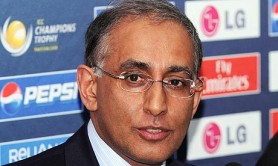MELBOURNE, (Reuters) – The International Cricket Council is eyeing June 2013 for the inaugural test world championship and will use current rankings to decide the four playoff spots, CEO Haroon Lorgat told Australian radio today.
Test cricket, which has struggled to maintain its profile since the advent of Twenty20, currently has a rankings system but no tournament to determine the top test nation.
The ICC has proposed a quadrennial tournament with the four best-performing nations to meet in semi-finals before playing off for the world title in a bid to boost flagging interest in the longest form of the sport.
“I think the first possible opportunity for us to have a playoff is in 2013 which means that the current rankings table would need to be used,” Lorgat said.
“For example, right now Australia would be struggling to qualify for the playoffs. But there may be another scenario with somebody else would also be in the frame depending on this result they might slip in.”
Lorgat was speaking on the sidelines of the third day of the second Ashes test between Australia, ranked fifth in the current test standings, and fourth-placed England.
“Going forward we’re looking at a league table that would be worked on points and for match winnings,” Lorgat said, but details on how to treat draws, which occur regularly in test cricket, were yet to be decided.
“One option is whichever is the highest ranked team would progress through. There’s the possibility of the timeless test, you’ve got to get to a result,” he added.
Lorgat also confirmed the 2015 one-day international World Cup to be held in Australia and New Zealand would be stripped from 14 teams to 10, while the biennial Twenty20 World Cup tournament would be expanded from 12 to 16.
Sri Lanka will host the next Twenty20 World Cup in 2012.
“In my view (the Twenty20 World Cup) is a better vehicle to develop the game, a better vehicle to promote the game, whereas the World Cup should be the flagship event, should be the best teams in the world,” he said.
International tournaments have been overshadowed by suspicions of match-fixing by players in recent years and the ICC will rule on charges of alleged breaches of its anti-courruption code by Pakistan test players Salman Butt, Mohammad Asif and Mohammad Amir in Doha in January.
The trio were provisionally suspended after newspaper allegations that they had arranged for deliberate no-balls to be delivered in the fourth test against England in August.
Lorgat said the Jan. 6-11 hearing would be the final say on the allegations, and the players would have no recourse to appeal, barring lodging their case with the Court of Arbitration for Sport.
Despite the allegations initially angering the Pakistan Cricket Board and its controversial head Ijaz Butt, cricket authorities there had become the first nation to implement an anti-corruption code for their domestic set-up, Lorgat said.
“We’ve done a lot of good work, Ijaz Butt himself is now involved with us,” he said.
“So now if there was a gap in the domestic environment, hopefully we’ve closed that.”










